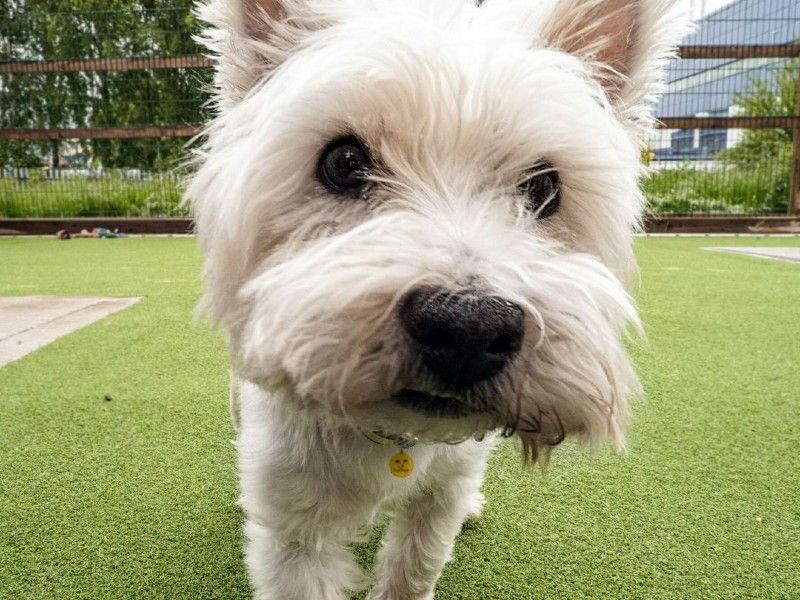Caring for an older dog
Whether you have an older dog or are considering adopting one, here's what you need to know about caring for them.

Distinguished older dogs are wonderful companions. Rehoming an older dog is the perfect way to make sure that pooches, at every stage of life, get the love and attention they deserve.
Are you thinking about welcoming an older dog into your home? Perhaps you want to know how best to care for one you already have? If so, here’s some helpful information about looking after older (and wiser) canine companions.
Ages and stages of life
Dogs over the age of seven can be considered 'senior', meaning they are older but still generally in good health. Meanwhile, dogs aged over 12 can be considered 'geriatric', which means they are at greater risk of health problems. While the average life expectancy of a dog is 12 years, smaller breeds tend to live longer than larger breeds. It’s important to note that the year at which a dog develops age-related health problems also differs depending on the breed.
Old age brings many changes; some sudden, others gradual. Caring for an older dog means being on the lookout for behaviours that signal problems and being prepared to adapt to support them. Being ready for their later years makes it easier to give them the high quality of life that they deserve.
Feeding an older dog
As they become less active, older dogs can be prone to putting on weight. Switching to a complete senior diet can help keep extra weight off. Feeding your dog smaller meals two or three times a day can support a healthy weight. But be careful with extra snacks and scraps.
If your dog suffers from neck or back pain, raising their food and water bowl can help them to eat and drink more comfortably.
Exercise for an older dog
Older dogs can become less energetic and tend to sleep more. On walks, let your dog set the pace. Try to go for frequent short walks instead of one long one. Your dog may not want to go on big hikes as they get older but will still need exercise to stay fit. These walks also provide vital mental stimulation and help keep their joints mobile.
Older dogs can show signs of joint stiffness after strenuous exercise so ensure they have a comfy bed to sleep on. You may also want to provide ramps to help your older dog to manage your stairs or car.
Health
Older dogs can struggle with their sight and hearing. Your dog’s eyes may appear cloudy, which could mean that they have cataracts. If you suspect your dog may be getting cataracts, please speak to your vet.
Most dogs adjust to failing sight, since it is usually a gradual process. Try to avoid moving the furniture in your house or leaving objects in their way. Keep them on the lead during exercise, especially near roads.
Your dog may lose the ability to hear certain sounds. For example, they may be able to hear a whistle, but not your voice. Be creative in developing new forms of communication with your dog.
Pay particular attention to the condition of your dog’s teeth and the length of their nails. Your dog’s nails will be less worn as their walks get shorter.
If your dog hasn’t been neutered already, there may still be benefits in doing so. It’s best to seek veterinary advice on this.
The condition of your dog’s coat may also change. Daily grooming is good for their coat and a great opportunity to check them for any new lumps or bumps that may indicate a health problem.
Twice-yearly veterinary check-ups are essential for an ageing dog.
Behaviour
To help your dog stay mentally active, try to provide new and interesting elements to their routine. Make plenty of time for brain games, enrichment and interaction with them.
Older dogs can start to exhibit symptoms of senility, including compulsive behaviours. Please notify your vet at the first sign of behavioural changes.
Your dog may begin to bark more often; this can be because something is troubling them, or because they are going deaf. Ask your vet for more advice.
As dogs get older, they can become less tolerant. It is important to respect your dog’s space.
Rehoming an older dog from Dogs Trust
Older dogs often find themselves looking for a new home in their twilight years and are sometimes overlooked. This is a great shame as dogs make lovely companions at any age.
You may think that older dogs are more likely to have been diagnosed with health problems and worry about the costs that come with rehoming an older dog. In some circumstances we may offer financial support for identified conditions, so don’t let this put you off applying.
You can teach an old dog new tricks! Older dogs still enjoy mental stimulation and training, as long as it is not too physically strenuous. They also tend to have better manners, come housetrained, and are not as destructive as a puppy.
Older dogs are often calmer, more relaxing to be around and need less exercise.
When rehoming an older dog, what you see is what you get. Their personality has already been shaped, so there should be no surprises in the future.
Related articles



